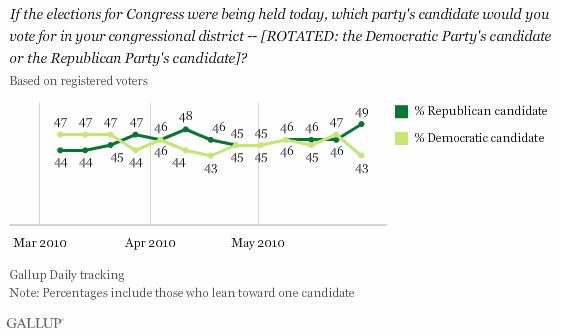Republicans Jump To Historic Lead In Gallup Generic Ballot
 The newest Gallup Generic Congressional Ballot poll shows a dramatic turn in favor of the GOP:
The newest Gallup Generic Congressional Ballot poll shows a dramatic turn in favor of the GOP:
PRINCETON, NJ — Gallup tracking of 2010 congressional voting preferences shows Republicans moving back ahead of Democrats, 49% to 43%, by two points their largest lead of the campaign to date. Registered voters’ preferences had been closely divided for the last several weeks.
These results are based on Gallup Daily tracking interviews conducted May 24-30. Republicans’ largest advantage on the generic ballot prior to now was four points during the week of April 5-11. The GOP held a three-point advantage the week of April 12-18.
The shift from a more competitive race to a Republican lead occurred the same week President Barack Obama averaged a 46% job approval rating, his lowest weekly average to date.
(…)
Given the Republican Party’s usual advantage in voter turnout in midterm elections, a tie on the generic congressional ballot among registered voters, as Gallup has been reporting, typically suggests that the party would win the national popular vote for Congress if the election were held today. Now, with a lead on the generic ballot, Republicans could be in a slightly stronger position than they have been in, though it is not clear whether the recent shift marks the beginning of a lasting change in the structure of the race or perhaps a short-term response to political events such as the Obama administration’s handling of the BP oil spill. The latter appeared to be the case earlier this year as Republicans built a small lead after the healthcare bill’s passage into law, but the slight bump for the GOP among registered voters did not last.
In addition to those factors, the poll also shows that Republican-leaning voters remain more enthusiastic than Democrats and that independent voters are decisively leaning toward the GOP by a margin of 47%-34%. While it’s hard to translate polls like this into predictions of how many seats might actually change hands in November, it seems fairly clear that the odds of significant Republican gains, in the range of 35-50 seats in the House and 5-7 seats in the Senate, are certainly within the realm of possibility.
As with all such things, of course, this is merely a snapshot it time and the only poll that matters is the one on November 2, 2010

If generic Republicans and Democrats were running against each other in November, a major Republican victory would be assured. The reality is that it’s significantly more complicated than that. In each Congressional district and in a third of the states an actual Republican will run against an actual Democrat for a House or Senate seat. Actual voters will make a determination among the candidates based on party affiliation, i.e. brand, the merits of the candidates, and the candidates’ abilities to wage an effective campaign.
I continue to believe that while Republicans will make gains in the House that are consistent with the average post-war off-year results but they probably aren’t going to do a lot better than that. The Senate is another story and I think that the Republicans have a good chance of taking the Senate.
Here in my state of Illinois, for example, we have a choice between the Democrat Alexi Giannoulias, a banker whose bank was just closed by the FDIC and political apparatchik, and Republican Mark Kirk, a long-time moderate Republican Congressman who’s been exaggerating his military career. It will be hard for the Chicago Democratic machine to turn out the black vote for Giannoulias and I suspect that Tea Party Republicans probably aren’t enthusiastic about Kirk. Turnout’s going to make the difference more than simple party affiliation.
That’s why the polls showing an enthusiasm deficit between likely Republican and likely Democratic voters are what Democrats should worry about rather than the simple generic polls of Americans or registered voters.
Hoisted by an oil spill. What a bunch of superstitious monkeys we are.
I would advise waiting for the next Gallup poll to see if this holds up. It seems mighty suspicious to me.
There are lots of other generic Congressional vote polls out there, and as far as I know, none of them picked up any dramatic shift like this – in fact i dont see any shift away from the Dems at all in the other polls.
The daily Gallup tracking poll has also showed a rather dramatic decline in Obama approval over the last couple weeks, and that two seem not to be mirrored in any other polls. Even Rasmussen, a strongly Republican-biased poll, actually showed Obama approval going up during this time.
So it sure looks like Gallup has drifited into a GOP friendly island in its ongoing sampling regimen. If true, I would predict that the next Congressional vote poll shows a marked return toward the general mean out there – which remains pretty much an even split between the parties.
In 1994, the generic was even between the two parties. If that is an accurate indicator, anything in the R favor would seem to portend disaster for the Dems in November.
I think Dave Schuler is right. The Generic ballot number is interesting, but not the most important thing to look at in this poll. The fact that Republican voters remain more enthusiastic than Democrats, and that independents are leaning to the GOP, are the big take-aways here.
Cause nothing has changed in 16 years. Nope. No sir.